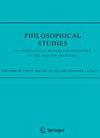持有不一致的信念是否合理?
IF 1.1
1区 哲学
0 PHILOSOPHY
引用次数: 0
摘要
在本文中,我将探讨是否存在这样的情况,即一个人持有不一致的信念是合理的,如果存在,这对认识论的合理性理论会有什么影响。在此过程中将会出现一系列问题--包括正当性与合理性之间的关系、失败的本质、认识论困境的可能性、积极认识论义务的重要性以及过渡态度与终结态度之间的区别。本文章由计算机程序翻译,如有差异,请以英文原文为准。
Is it ever rational to hold inconsistent beliefs?
In this paper I investigate whether there are any cases in which it is rational for a person to hold inconsistent beliefs and, if there are, just what implications this might have for the theory of epistemic justification. A number of issues will crop up along the way – including the relation between justification and rationality, the nature of defeat, the possibility of epistemic dilemmas, the importance of positive epistemic duties, and the distinction between transitional and terminal attitudes.
求助全文
通过发布文献求助,成功后即可免费获取论文全文。
去求助
来源期刊

PHILOSOPHICAL STUDIES
PHILOSOPHY-
CiteScore
2.60
自引率
7.70%
发文量
127
期刊介绍:
Philosophical Studies was founded in 1950 by Herbert Feigl and Wilfrid Sellars to provide a periodical dedicated to work in analytic philosophy. The journal remains devoted to the publication of papers in exclusively analytic philosophy. Papers applying formal techniques to philosophical problems are welcome. The principal aim is to publish articles that are models of clarity and precision in dealing with significant philosophical issues. It is intended that readers of the journal will be kept abreast of the central issues and problems of contemporary analytic philosophy.
Double-blind review procedure
The journal follows a double-blind reviewing procedure. Authors are therefore requested to place their name and affiliation on a separate page. Self-identifying citations and references in the article text should either be avoided or left blank when manuscripts are first submitted. Authors are responsible for reinserting self-identifying citations and references when manuscripts are prepared for final submission.
 求助内容:
求助内容: 应助结果提醒方式:
应助结果提醒方式:


